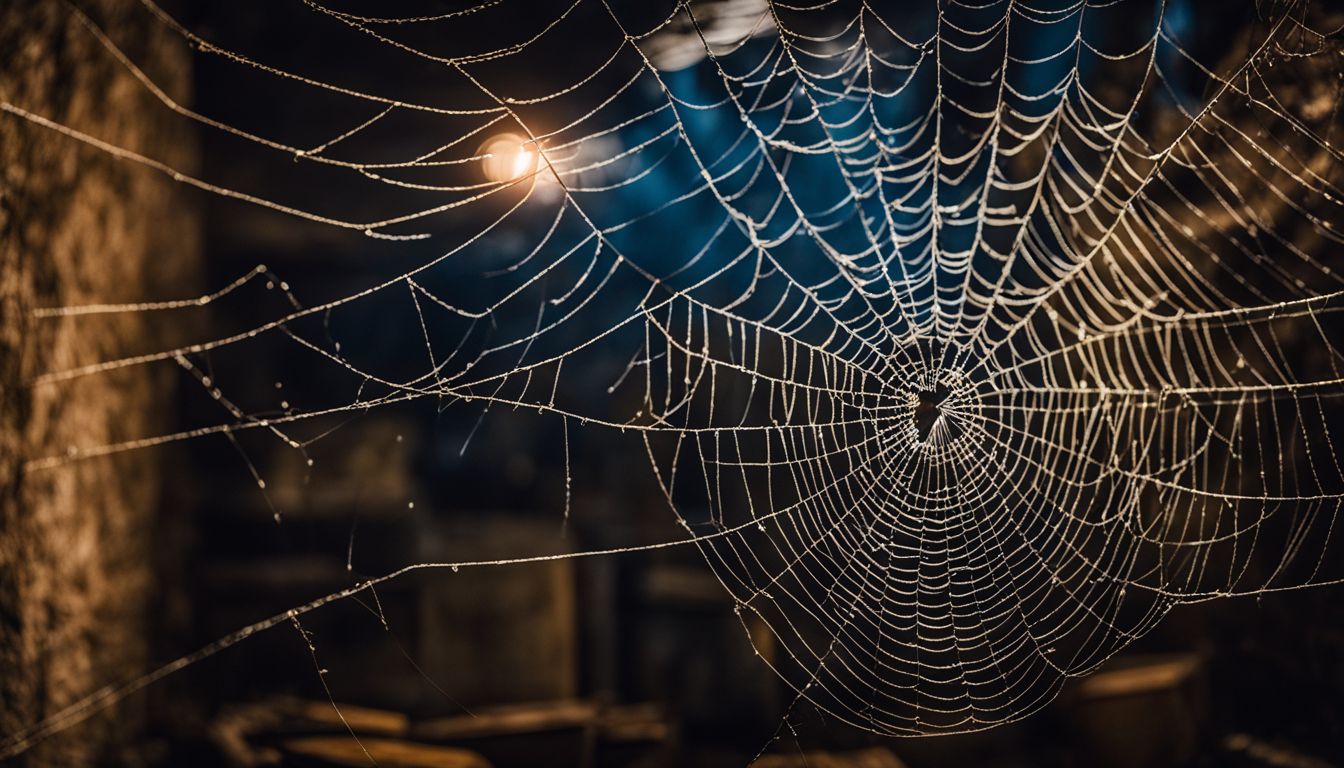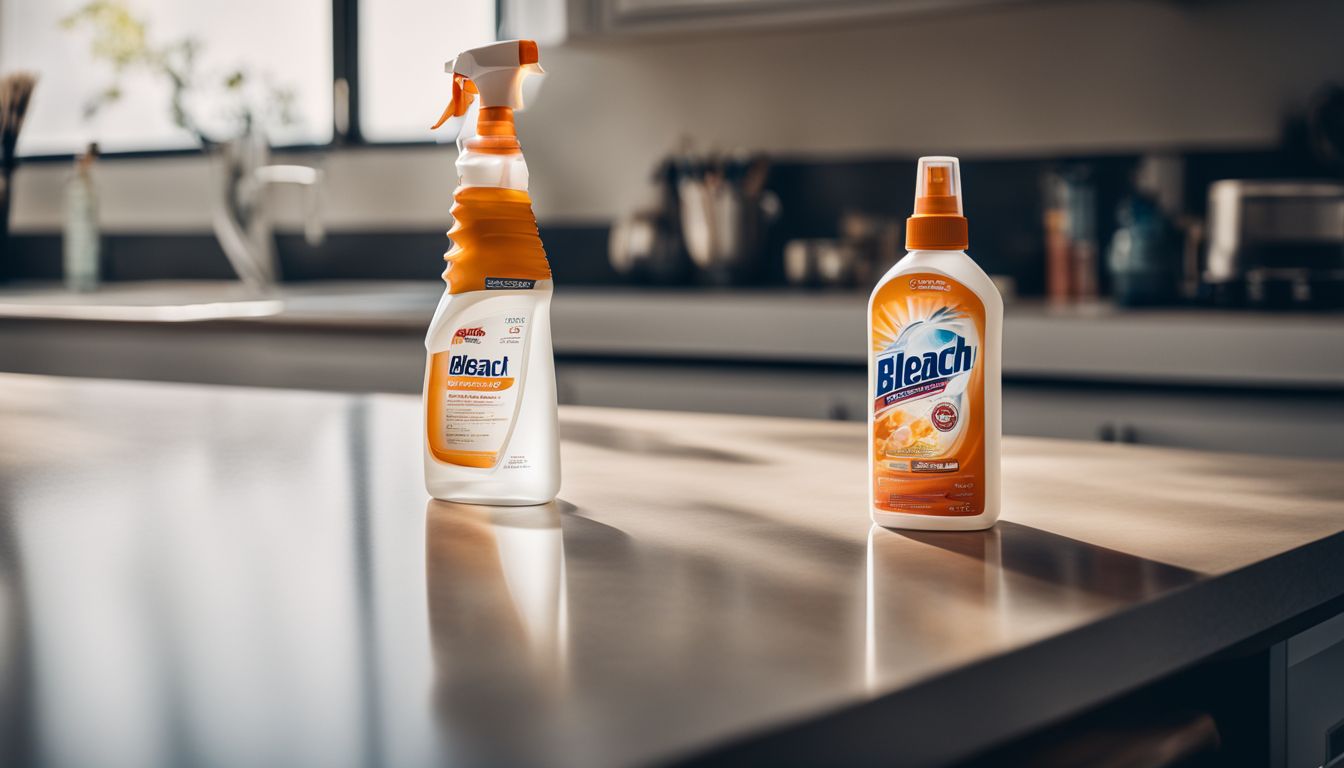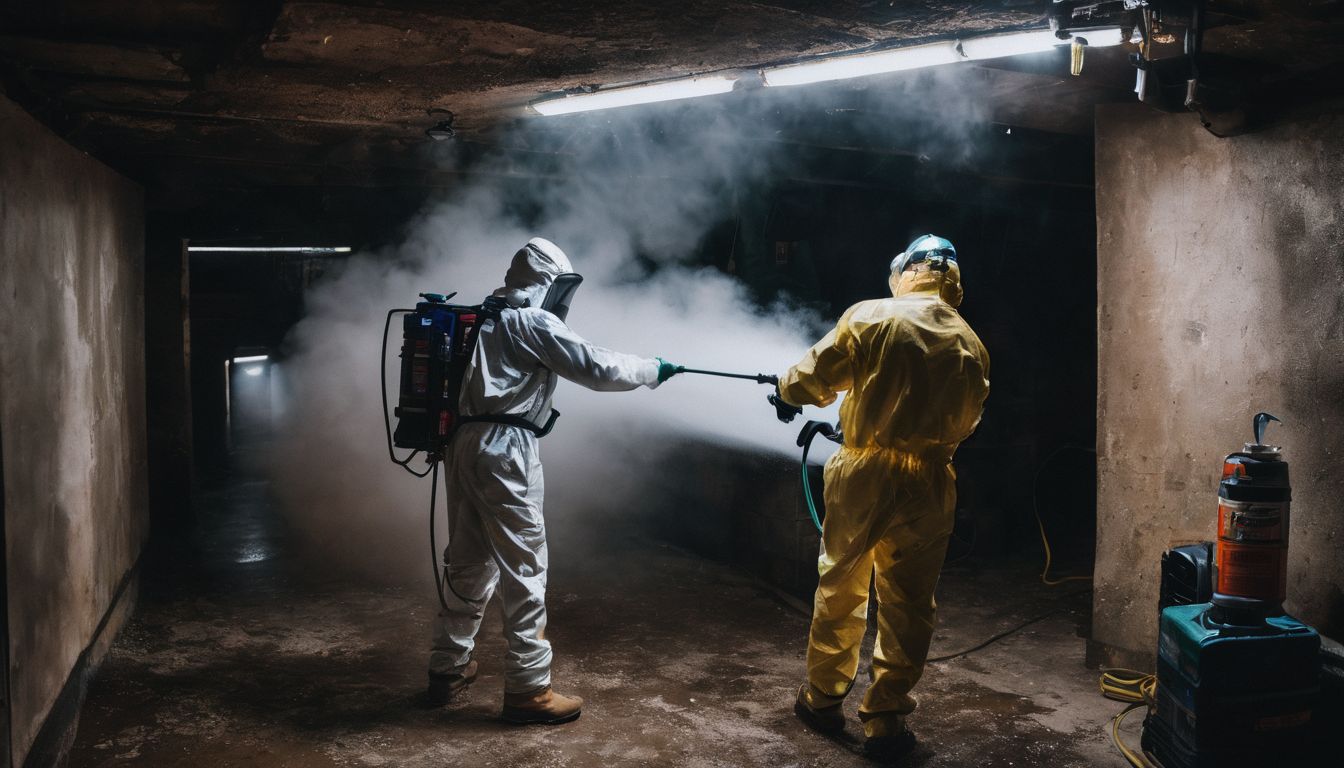Are spiders taking over your home? It turns out bleach might just be the unexpected ally you need. This post will guide you through using regular household bleach to send those eight-legged critters packing, ensuring a spider-free zone.
Keep reading to uncover a simple solution that’s probably already in your cupboard!
Key Takeaways
- Bleach is an effective spider pesticide, damaging their bodies and suffocating them upon contact.
- To use bleach safely for spider control, mix one part bleach with three parts water and apply the solution directly to areas where spiders hide or build webs while following essential safety precautions.
- In addition to using bleach, maintaining a clean environment, sealing entry points, and employing natural or commercial repellents are crucial in preventing spider infestations in your home.
- While bleach can be effective, it’s important to consider its harmful side effects and corrosive nature when opting for spider extermination methods.
Does Bleach Kill Spiders? Understanding Its Effectiveness

Bleach has been touted as an effective spider pesticide, but understanding the science behind its effectiveness is crucial. This section will delve into how bleach impacts spiders and their eggs, helping you make an informed decision on using it for spider control.
The Science Behind Bleach as a Spider Pesticide
Bleach is a strong chemical that can clean and kill germs. It does more than just make things white. This power also works on spiders. If bleach touches a spider, it can hurt its body and stop it from breathing well.
This makes bleach a useful tool in the fight against these eight-legged pests.
Inside their bodies, bleach is really bad for spiders. It messes up their DNA if they eat it or get it inside them some other way. Since spiders have tiny parts inside that help them live, damaging these with bleach can kill them fast.
Now let’s talk about how to use this knowledge to make your home spider-free!
The Impact of Bleach on Spiders and Their Eggs
Knowing how bleach acts as a pesticide, it’s important to look at what it does to spiders and their eggs. Bleach can kill spiders on contact because its main part, sodium hypochlorite, is very strong and destroys their bodies.
When you spray bleach directly on them, it can be deadly.
But just spraying bleach around won’t keep your home spider-free. It doesn’t work well on spider eggs hidden in webs or corners because the thick layers of silk protect the baby spiders inside.
To stop more spiders from coming, you need to remove webs and egg sacs by cleaning up regularly and keeping your house tidy.
How to Use Bleach Safely to Combat Spider Infestations

To effectively combat spider infestations using bleach, it’s important to prepare the solution properly and apply it with safety measures in mind. This section will cover the correct way to create a bleach solution, safety precautions when handling bleach, and techniques for using it to eliminate spiders in your home.
Preparing the Bleach Solution
Mixing bleach with water makes a spray to fight spiders. Here’s how to do it right.
- Find a clean spray bottle. You will use this to mix and apply your bleach solution.
- Put on gloves and maybe eye protection, too. Bleach can hurt your skin and eyes.
- Measure out one part chlorine bleach carefully. This is the strong stuff that kills germs and bugs.
- Pour three parts water into the spray bottle. Do this for every one part of bleach you used.
- Add the bleach to the water in the bottle. Always add bleach to water, not the other way around, to be safe.
- Close the spray bottle tight and shake it gently. Now your spider – killing spray is ready.
Safety Measures When Using Bleach
Using bleach for pest control requires some safety measures to protect yourself and others. Here are important safety measures to follow:
- Always wear protective gear, such as gloves and a mask, when handling bleach to avoid skin and respiratory irritation.
- Ensure the area is well – ventilated by opening windows or using fans to prevent inhaling harmful fumes.
- Never mix bleach with ammonia or other cleaning products, as it can produce toxic fumes that are dangerous when inhaled.
- Store bleach away from children and pets in a cool, dry place to prevent accidental ingestion.
- Rinse surfaces thoroughly after using bleach to remove any residue and prevent potential skin irritation.
Application Techniques for Spider Elimination
After ensuring safety measures when using bleach, it’s important to know the right application techniques for spider elimination. Here are some tips for effectively applying bleach to get rid of spiders in your home:
- Spray the bleach mixture directly onto areas where spiders are likely to hide or build webs, such as corners, cracks, and crevices.
- Use a cloth or sponge soaked in the bleach solution to wipe down surfaces where spiders may have left their webbing or eggs.
- When applying the bleach solution, make sure to wear gloves and a mask to protect your skin and respiratory system from the harsh chemicals.
- Leave the treated areas undisturbed for some time to allow the bleach to take effect on any spiders or eggs present.
- After letting the bleach sit for a while, thoroughly rinse and wipe down the surfaces with water to remove any residual bleach and avoid potential hazards.
- Repeat the application of the bleach mixture regularly in areas prone to spider activity to maintain a spider-free environment.
- Consider using alternative natural remedies or commercial insecticides in conjunction with bleach for enhanced spider control if so desired.
Understanding Spider Senses: Do Spiders Have Noses??
Spiders do not have noses, but they have sensory organs to smell. Spiders use their sense of smell for finding food and mates and detecting danger. They can detect smells using sensitive hairs and sensory organs on their legs and bodies.
https://www.youtube.com/watch?v=wV3xLIpWlQo
Alternatives to Bleach for Spider Control
Natural remedies and commercial spider repellents are effective alternatives to bleach for controlling spiders in your home. For more information on these alternative methods, keep reading!
Natural Remedies and Their Benefits
- White vinegar, when sprayed in spider – prone areas, can deter spiders due to its acetic acid content, which disrupts their sense of smell and taste.
- Citrus peels and essential oils like lemon or orange are effective in repelling spiders as they dislike the strong scent. Placing these around entry points or nesting areas can help keep them at bay.
- Mint leaves or essential oil can be used to create a mint spray that not only smells refreshing but also repels spiders effectively.
- Diatomaceous earth, a natural powder made from fossilized remains of diatoms, acts as a desiccant, dehydrating and ultimately killing spiders upon contact.
- Cedar chips or cedar oil emit an odor that is unpleasant to spiders, making them an excellent natural repellent for your home.
Commercial Spider Repellents and Insecticides
When considering commercial spider repellents and insecticides, it’s important to look for products specifically formulated for spider control. Several sprays are available in the market designed to effectively manage spiders, ants, cockroaches, and other crawling insects.
These industry suppliers have strategies, products, and upcoming innovations tailored for successful spider management. It’s essential to choose products that are safe for indoor use and environmentally friendly while being effective in combating spider infestations.
Industry suppliers offer a range of options catering to different preferences – from non-toxic remedies to insecticidal solutions. Many of these products also consider environmental impact while providing efficient pest control strategies.
Preventative Measures to Keep Spiders at Bay
Maintaining a clean environment and sealing entry points are key preventative measures to keep spiders at bay. Read on to discover more tips on eliminating spiders in your home!
Maintaining a Clean Environment
To keep spiders away, maintaining a clean environment is essential. Here are some tips to help you achieve this:
- Regularly vacuum and dust your home, paying special attention to corners, baseboards, and behind furniture where spiders often hide.
- Keep your yard well – maintained by trimming back bushes and shrubs and removing any excess debris or clutter.
- Store firewood away from the house and elevate it off the ground to discourage spiders from nesting.
- Fix any leaky faucets or pipes to reduce moisture, as spiders are attracted to damp areas.
- Use airtight containers for food storage to prevent attracting other pests that may serve as spider prey.
Sealing Entry Points and Reducing Attractants
To keep spiders from entering your home and to make it less enticing for them, follow these steps:
- Seal cracks and crevices in walls, floors, and around windows and doors using caulk or sealant. This prevents spiders from finding a way inside.
- Keep the area around your home free of debris, such as woodpiles and dense vegetation, which can attract insects that spiders feed on.
- Regularly remove spider webs and egg sacs found in corners, under furniture, and in other secluded areas to discourage spiders from building their homes in your space.
- Make sure to clean up any food crumbs or spills promptly, as this will help eliminate potential sources of food for both insects and spiders.
- Use essential oils like eucalyptus oil or lavender oil as a natural spider repellent by putting a few drops on cotton balls and placing them strategically around your home.
Conclusion and Final Thoughts on Spider Extermination Methods
In conclusion, bleach can effectively kill spiders by breaking down their exoskeleton and suffocating them. However, it should be used cautiously due to its harmful side effects and corrosive nature.
In addition to bleach, maintaining a clean environment, sealing entry points, and using natural or commercial repellents are also effective in keeping spiders at bay. By combining these methods, you can ensure a spider-free home without relying solely on potentially hazardous chemicals like bleach.
To learn more about the unique ways spiders sense their environment, check out our detailed article on whether spiders have noses.
FAQs
1. Will bleach kill spiders in my home?
Yes, bleach can kill spiders because it is corrosive and strong enough to be a disinfectant that destroys spider bodies.
2. Can I use other methods besides bleach to get rid of black widow spiders?
Sure, you might want to try insect repellents or chemicals like pyrethrins that are made to target bedbugs and can also work on black widow spiders.
3. Is it safe to mix bleach with other cleaners when killing spiders?
No, don’t mix bleach with other cleaners because this can create dangerous gases. Use bleach carefully by itself.
4. Where can I learn more about using bleach against dead spider problems?
You can find out more by looking through your inbox for affiliate links or guides that talk about how well bleach works for getting rid of dead spiders.




